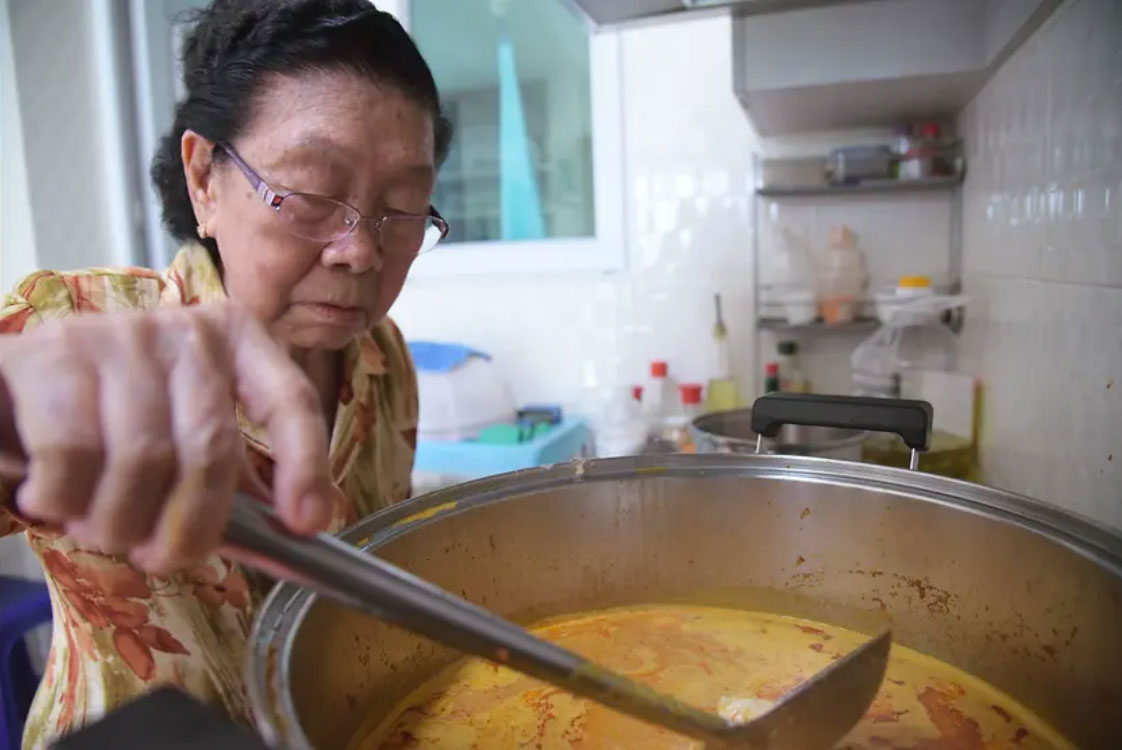There is an excellent article on the Channel News Asia site that talks about many of the issues we hold close to our hearts at Rempahs.
The Slow Death of Peranakan Cuisine notes that Nyonya cooking is being modernised, with “new” technology like spice grinders, and new recipes like the controversial buah keluak spaghetti dish served at Violet Oon’s National Kitchen.
It’s a new development on an age-old debate.
She’s not the only one who’s finicky about her food – you can never please a Peranakan because recipes vary from family to family, which poses a conundrum over what’s “most authentic”.
Take these dishes for example – Babi Chin and Babi Pongteh are almost-similar dishes of belly pork stewed in a fermented soya bean paste; it’s just that one calls for spices like coriander powder and cinnamon sticks, while the other doesn’t.
But do a quick search on the internet and you’ll find heated arguments among food bloggers about which dish has the additional spices. And the debate extends to two notable Singaporean cookbooks too – according to Mrs Lee’s Cookbook, Babi Chin does not have coriander powder, but her sister Mrs Leong’s recipe calls for it.
Peranakan cuisine developed as an adaptation of many other cuisines, and every family personalised their recipes. These were often handed down through generations by being taught in the kitchen, without being written down. They are often imprecise, adding for “enough” of an ingredient to achieve a particular taste.
Yet, even as recipes are passed on, variations continue to emerge. Upon tasting the gravy, Mrs Gan and Mrs Wong start bickering about how much coconut milk to add.
“You can never get a precise recipe from any Peranakan lady and I think that’s one of the difficulties (in maintaining consistency),” says Mrs Wong.
“They will always say ‘one handful of this, another handful of that’. It’s always agak-agak (estimate)!”
It leads to an important question. What happens to these traditional dishes when a new generation finds themselves too time-pressed to spend all that time in the kitchen. It may have been the norm in the 1960s to spend a couple of hours making a Laksa paste (as Mrs Gan reminisces in the article), but it seems that life has sped up since then and few of us can spend that kind of time preparing a dish anymore.
This was something our chief-foodie Alice Chua thought long and hard about.
It’s not the actual cooking that is time-consuming in Nyonya cooking. It’s the pounding of spices like onions and garlic, fresh and dried chillies, lemongrass and turmeric, into the paste that Peranakans call a rempah.
It’s the rempah that is the building block of the familiar, homey flavour of the dishes. Once you get that right, the cooking itself is quite easy.
So, Alice set out to see if the food technology we have available to us today would allow her to create the pastes in a way that would please even the fussiest traditionalist. The ingredients had to be all-natural, because no Peranakan kitchen would ever add artificial flavours to food. And, the recipes had to be authentic.
It turned out that it was possible, and that set her on a journey to perfect the recipes.
Each rempah went through many iterations, given out to tasters in the community, fine-tuned and given out again (and again), until many of the cooks agreed that they were indistinguishable from the ones they would spend hours making from scratch at home.
Authentic Nyonya rempahs, without the hours spent at the markets and in the kitchen. It seems like a simple dream but Alice, and the Peranakan community in Singapore, had never seen it achieved before. You could buy some cheap pastes in the supermarket, but they were always full of inauthentic (and often artificial) ingredients and the flavour-profiles were never right. That’s just not acceptable in a community that is so passionate about their heritage.
The most important mission for Alice was to create a way to make it possible for everyone to cook authentic Nyonya food at home, no matter how busy they are. The article in Channel News Asia sums it up brilliantly:
Surely, food will always be the common factor that ties members of the same community together. As [Professor Lily Kong, Lee Kong Chian Chair Professor of Social Sciences at the Singapore Management University] put it: “Our tastes are cultivated from young by our mothers’ cooking” – and that is likely the reason why nothing will ever be as good as home-cooked food.


